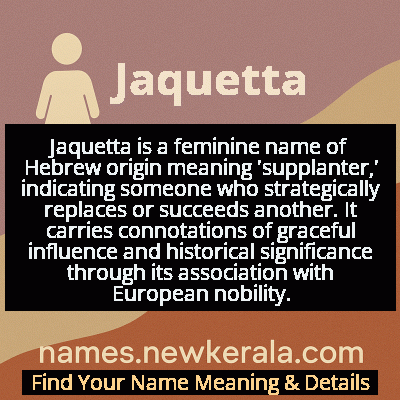Jaquetta Name Meaning & Details
Origin, Popularity, Numerology Analysis & Name Meaning of Jaquetta
Discover the origin, meaning, and cultural significance of the name JAQUETTA. Delve into its historical roots and explore the lasting impact it has had on communities and traditions.
Name
Jaquetta
Gender
Female
Origin
Hebrew
Lucky Number
5
Meaning of the Name - Jaquetta
Jaquetta is a feminine name of Hebrew origin meaning 'supplanter,' indicating someone who strategically replaces or succeeds another. It carries connotations of graceful influence and historical significance through its association with European nobility.
Jaquetta - Complete Numerology Analysis
Your Numerology Number
Based on Pythagorean Numerology System
Ruling Planet
Mercury
Positive Nature
Adventurous, dynamic, curious, and social.
Negative Traits
Restless, impatient, inconsistent, prone to indulgence.
Lucky Colours
Green, white.
Lucky Days
Wednesday.
Lucky Stones
Emerald.
Harmony Numbers
1, 3, 9.
Best Suited Professions
Sales, marketing, travel, entertainment.
What People Like About You
Versatility, charisma, adventurous spirit.
Famous People Named Jaquetta
Jaquetta of Luxembourg
Noblewoman
Mother of Elizabeth Woodville and key figure in English royal history
Jaquetta Hawkes
Archaeologist
Influential writer and researcher in British archaeology
Jaquetta Agneta Mariana van Aerssen
Noblewoman
Dutch aristocrat and cultural patron
Name Variations & International Equivalents
Click on blue names to explore their detailed meanings. Gray names with will be available soon.
Cultural & Historical Significance
Extended Personality Analysis
Individuals named Jaquetta are often characterized by a unique blend of traditional values and modern adaptability. They typically possess strong intuitive abilities and emotional intelligence, allowing them to read situations and people with remarkable accuracy. This makes them excellent strategists and problem-solvers who can navigate complex social and professional landscapes. Their 'supplanter' heritage suggests an innate understanding of timing and positioning—knowing when to step forward and when to hold back. Jaquettas often exhibit a quiet confidence that doesn't require external validation, combined with a diplomatic nature that helps them build consensus and maintain relationships. They tend to be lifelong learners with interests spanning history, arts, and contemporary issues, reflecting the name's balance between heritage and progress. Their strength lies in their ability to influence without dominating, to lead without demanding attention, making them particularly effective in roles requiring subtlety and long-term vision. Many display a natural elegance in their communication and demeanor, often becoming the calm center in chaotic situations.
Modern Usage & Popularity
In contemporary naming practices, Jaquetta occupies a unique position as a historically rich but uncommon choice. Its usage remains relatively stable but rare, typically selected by parents who value historical significance and distinctive sounds over current popularity trends. The name has seen minor resurgences connected to popular historical media, particularly following television adaptations like 'The White Queen' which featured Jaquetta of Luxembourg prominently. Modern parents choosing this name often appreciate its aristocratic heritage while recognizing its adaptability to contemporary life. It appeals to those seeking feminine names with substance and character, offering an alternative to more common historical names like Eleanor or Catherine. The name's current usage reflects a growing interest in reviving names with strong historical narratives and meaningful backgrounds, particularly those associated with influential women from history. Its rarity ensures that children named Jaquetta will have a distinctive identity while carrying a name with centuries of cultural weight.
Symbolic & Spiritual Meanings
Symbolically, Jaquetta represents the power of strategic influence and graceful transformation. The name embodies the concept of positive supplanting—not merely replacing but improving and evolving what came before. It carries connotations of royal wisdom, historical continuity, and the quiet strength that shapes events from behind the scenes. The name symbolizes the bridge between different eras and cultures, reflecting adaptability while maintaining core identity. It represents feminine intelligence that operates through understanding rather than force, and influence achieved through relationships and reputation rather than direct command. The historical associations with survival through political turmoil give it symbolic weight related to resilience and the ability to maintain dignity and purpose through challenging transitions. Jaquetta symbolizes the idea that true power often lies in patience, timing, and the strategic application of knowledge rather than overt displays of authority.

